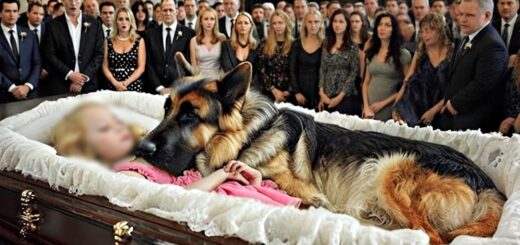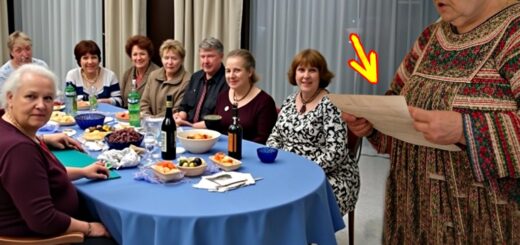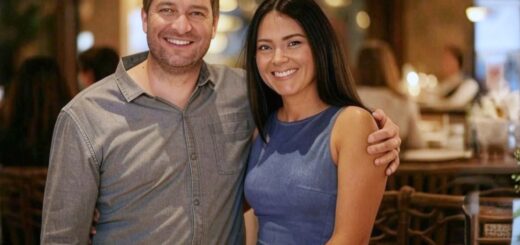“Don’t go to your husband’s funeral. Check your sister’s house…” That’s the letter I got on the day we were burying my husband. I thought it was some sick joke, but I decided to stop by my sister’s place anyway—I had a key. And when I opened the door, I was stunned by what I saw…
My legs wouldn’t obey me, my knees felt like jelly. I made it to the hallway, put on my shoes, walked outside, and closed the door behind me. I stood at the gate, frozen, with no idea what to do next.
The world had collapsed, just like that, in five minutes. Everything I believed in, everything I thought I knew about my life, turned out to be a lie. Patrick was alive.
Patrick was with Brenda. Patrick had betrayed me. But the worst part wasn’t even that.
The worst part was not knowing how long it had been going on. A week? A month? A year? Had they been together this whole time, while I was mourning, planning his funeral, picking out a casket, ordering the memorial lunch? Had they been laughing at me? I walked home. Slowly, like I was dreaming.
People on the street gave me strange looks, maybe I looked insane. A woman in a black dress, walking with no purpose, staring into nothing. The driver was waiting for me outside the house.
He was smoking near the car, glancing nervously at his watch. Meredith, we should go, he said when he saw me. We’re already late.
I looked at him and couldn’t get a single word out. How do you explain that you can’t go to your husband’s funeral because he’s alive? How do you say that this is all some sick performance and I’m just the fool playing the lead? Meredith, are you alright? He stepped closer. Do you feel sick? Should I call a doctor? I shook my head and went inside.
Locked the door. Leaned against it, and finally broke down crying. Not from grief.
From rage. From humiliation. From being played for a fool.
From not knowing what the hell to do next. The phone wouldn’t stop ringing. Patrick’s mother.
His brother. Friends. Everyone asking where I was, why I wasn’t there, what had happened.
I didn’t answer. I just sat there on the hallway floor, listening to the phone ring. After an hour, the calls stopped.
Maybe they thought I’d collapsed. Maybe they thought I was in the hospital or something. Maybe the funeral went on without me.
A funeral for an empty coffin. I got up and went to the bedroom. Our bedroom.
Mine and Patrick’s. His clothes were still there. Our photos still hung on the walls.
It all looked like the set of a stage play. I sat on the bed and tried to make sense of the last few weeks. Patrick’s illness.
His death. The funeral preparations. Was any of it real? Or just an act? Patrick got sick a month ago.
At first, he said he was just tired. Then came chest pains. I made him see a doctor.
The doctor said it was stress, gave him meds, told him to rest. But Patrick kept getting worse. Then came the ambulance, the hospital, the ICU.
The doctor said it was heart failure, said it was serious. I spent days and nights in that hospital. Patrick was hooked up to IVs, pale, weak.
We barely spoke, he was always asleep or pretending to be. Three days ago, I got a call from the hospital. They said Patrick had died in his sleep that night.
His heart gave out. I remember collapsing to the floor when I heard the news. I remember screaming, refusing to believe it was real.
I remember going to the hospital and seeing his body under a white sheet. But now I realized that could have been part of the act too. Bribed doctors, fake paperwork, someone else’s body in the morgue.
Anything’s possible if you have the money and the right connections. And Patrick had both. He worked for a construction firm, handled big contracts.
He had friends in city offices, hospitals, even the police. If he wanted to disappear, he had the means to pull it off. But why? I got up and walked to the window.
Outside, life went on like nothing had happened. People ran errands, kids played in the yard, dogs chased each other between the trees. No one knew my world had just fallen apart.
The phone rang again. Brenda’s name lit up on the screen. I stared at it for a long time, unsure if I should pick up.
What was she going to say? Pretend to grieve? Ask why I didn’t show up to the funeral? I answered. Brenda sounded anxious, almost frantic. She said she’d been trying to reach me everywhere, that everyone was worried, that the funeral happened without me and people thought something had happened to me.
She said she was on her way to my place and that we needed to talk. I listened to her voice and tried to figure out, did she know I’d seen them together? Or did she think her little secret was still safe? She arrived 30 minutes later. I opened the door and saw her red eyes, messy hair, the black dress.
She looked like someone who just buried a loved one. She hugged me and started crying. Said she understood my grief, that she was barely holding it together too, that Patrick had been like a big brother to her.
She said we needed to support each other through this difficult time. I stood in her arms, feeling the anger grow inside me. How could she act like this? How could she look me in the eye and lie? But I didn’t say a word.
I just nodded and listened, because I had no idea what to do with what I knew. I didn’t know how to use it, yet. Brenda stayed the whole evening.
We sat in the kitchen drinking tea while she talked about the funeral. How beautiful it all was. How many people came to say goodbye.
How everyone asked about me. She said Patrick’s mother was very upset I wasn’t there, that his brother was furious and said it was disrespectful to the memory of the dead. That their friends were confused and worried.
Meredith, you have to explain it to them, Brenda said. Call them. Apologize.
Tell them you were sick, that you were in shock. They’ll understand. I nodded, thinking about how perfectly she played her role.
The caring sister, concerned about the grieving widow’s reputation. No one would ever suspect that while the funeral was happening, she was sleeping peacefully. After Brenda left, I locked the door and sat down to make a list.
A list of everything I needed to figure out. A list of questions that needed answers. How long have Patrick and Brenda been together? Who else knows Patrick is alive? How did they fake his death? Why did they do it? What are they planning next? And the biggest question of all, what am I supposed to do with this knowledge? I could go to the police and tell them everything.
But who would believe me? They’d say I’d gone mad from grief, that I was imagining things. And if Patrick really did bribe the doctors, then he has an official death certificate. He has paperwork.
Witnesses. I could go back to Brenda’s house and cause a scene. Confront them when they’re together, demand answers.
But what would that change? They’d just say I was crazy. Or I could pretend I didn’t know a thing. Keep playing the grieving widow.
Quietly gather evidence. Find out the whole truth, and then strike so hard they’d have no way to cover it up. That last option felt like the only sane one.
I hid the letter in my jewelry box and got into bed. But I couldn’t sleep. I just lay there in the dark, thinking about how tomorrow would be the start of a new life.
A life where I’d pretend I didn’t know the truth. A life where I’d be planning revenge. In the morning, Patrick’s mother called.
Her voice was cold, distant, offended. She said she couldn’t understand how I could miss my own husband’s funeral. That it was a disgrace to the family.
That people were talking. I apologized. Told her I’d gotten sick, passed out, and only came to in the evening.
Said I’d never forgive myself for missing it. Her tone softened a bit. She said she understood my grief but wished I’d at least told someone, I had everyone worried.
We agreed to meet the next day. She wanted to give me Patrick’s things from the hospital and talk about the inheritance. After that, Patrick’s brother called.
Then friends. They all said the same thing, they understood I was grieving, but they were concerned. Said my behavior was strange.
They all wanted answers. And I gave them answers. Apologies.
I played the role of a woman on the brink, shattered by her husband’s death. And with every conversation, it became clearer, Patrick was dead to everyone but me. For the rest of the world, he was gone and buried.
Which meant the plan had been executed down to the smallest detail. That afternoon, I went to the cemetery. I needed to see the grave they’d dug for the empty coffin.
It was fresh. The dirt hadn’t settled yet. Wreaths and flowers lay on the mound.
A temporary plaque read, Patrick Whittaker. 1978-2023. Loving husband and son.
I stood there, staring at that fake grave, thinking about the empty box, or someone else’s body, buried underneath. And about my husband drinking coffee in my sister’s kitchen. A few feet away, an elderly woman with flowers was standing quietly.
She looked at me and shook her head. You must be the wife, she said. You weren’t at the funeral yesterday.
People noticed. I nodded. I get it, she said.
It’s hard, losing a husband so young. I lost mine early too. But you should’ve come.
For the people. For the memory. She laid the flowers on a neighboring grave and walked away.
I stayed there, alone. Staring at the fake grave of my very much alive husband, trying to make sense of what I was feeling. Anger.
Pain. Relief. Maybe all of it at once.
That evening, I sat at home thinking about tomorrow. I’d have to meet Patrick’s mother, take his things from the hospital, talk about the inheritance. Pretend I was still deep in mourning.
Keep playing the part of the widow. Meanwhile, Patrick would be starting his new life with Brenda. Free.
Happy. Rid of the wife he’d clearly grown tired of. But what he didn’t know was that I knew the truth, and that was the one advantage I had.
I woke up the next morning on the hallway floor. My neck ached, my back throbbed, and my head pounded like a drum. For the first few seconds, I didn’t know where I was or what had happened.
Then it all came rushing back, the letter, Brenda’s house, Patrick at the kitchen table. Alive. I got up, smoothed out the black dress I’d never taken off, and checked the time.
6.30 in the morning. In three hours, I was supposed to be at Patrick’s mother’s house, picking up his things from the hospital and talking about the inheritance. I went to the bathroom and caught a glimpse of myself in the mirror, and flinched.
Red eyes, smudged mascara, hair like I’d been through a storm. That’s what a woman who’s just lost her husband is supposed to look like. The perfect look for what I was about to do.
Because I’d made a decision. I don’t know exactly when it happened, maybe during the night, lying on the floor, thinking about what came next. Maybe that morning, when I saw my reflection.
But I knew one thing for sure, I wasn’t going to run to Patrick and Brenda, screaming and throwing accusations. I was going to play the grieving widow. I was going to gather information.
Find out why they’d staged this whole thing. And then I’d strike, hard enough that they’d never recover. I showered and did my makeup, but only lightly, I needed to look pale, worn out.
I put on another black dress, something more formal. Grabbed my purse, the one with the letter inside, and headed to Patrick’s mother’s house. Margaret lived in an old house downtown.
The same house where Patrick grew up, spent his childhood and teenage years. I’d been there many times before, but today, everything felt different. Every photo on the wall, every object in that house reminded me of the man who had betrayed me so cruelly.
Margaret met me at the door. She was dressed in black, her hair neatly done, her face tight with grief. But when she saw me, her expression softened.
She hugged me and said she understood my pain. That she herself could barely keep it together after losing her son. That we needed to support each other through this.
I let myself cry. I didn’t even have to fake it, tears came on their own. But I wasn’t crying for Patrick’s death.
I was crying for the life I’d just lost. We sat in the living room, and Margaret started telling me about the funeral. Then she brought out a box of Patrick’s things from the hospital.
His watch, his wedding ring, wallet, and phone. I picked up the phone and turned it on. The last messages were from me, I’d texted him the day he’d died, asking how he was feeling.
He never replied. Now I knew why. Margaret pulled out a folder with documents, his will, insurance papers, bank accounts…
























